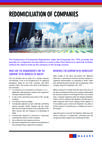
Redomiciliation of companies
What are the requirements for the company to re-domicile to Malta?
The law provides that in order for a foreign company to re-domicile, it has to be incorporated in an approved jurisdiction, being EU and EEA countries, and OECD member states. The request to be made to the Registrar has to include:
- A resolution by extraordinary resolution, or as applicable, authorizing the company to be registered
as being continued in Malta; - A copy of constitutive document of the foreign company;
- A certificate of good standing;
- A declaration signed by at least 2 directors confirming general company details, together with the notice given by the foreign company to the authorities of the other country that the company is re-domiciling to Malta;
- A declaration signed by 2 directors or equivalent confirming the solvency of the company;
- List of directors and company secretary;
- Payment of registration fees, which amount depends on the authorized share capital of the company.
When will the company be re-domiciled?
Upon receipt of the above documents, the Registrar shall issue a provisional certificate that the company is registered (provisionally) as continuing in Malta, which date shall be deemed to be the date of registration of the company under the Companies’ Act, 1995.
Within a period of 6 months from the date of the issue of the above mentioned certificate, the company shall submit documentary evidence to the Registrar that it has ceased to be a company registered under the foreign jurisdiction.
Failure to do so, will grant the Registrar the discretion to either strike the name of the company off the register, or if reasonable cause is shown, the Registrar may allow a further period of 3 months prior to striking the name of the register.
Upon this proof is received, the Registrar shall issue the official certificate of continuation confirming that the company has been registered as continuing in Malta.
What about licensed or public companies?
If the foreign company carries on a licensed activity, it has to provide evidence of the consent of the foreign competent authority that the company can be registered as being continued in Malta. Moreover a Maltese license to carry on such activities shall be required. In the case of foreign public companies, the most recent prospectus is required together with the consent of the foreign competent authority that the company is allowed to register as being continued in Malta.
What are the other advantages of redomiciling a company in Malta?
Apart from the advantage of not entering into winding up and liquidator costs in the foreign country, the company may benefit from a reduced effective tax charge. These provisions provide that once a company distributes its profits to its shareholder, the effective tax charge of the company can be reduced to 5%, and in some cases even to 0%.
How can Mazars help
Mazars is a global integrated firm with presence in major economies of the world, so we understand the complexities of tax in today’s global economic climate. We provide both national and international tax advice to a diverse global client-base. We work with global owner managed businesses and European listed companies, but also with local companies, and private individuals.


